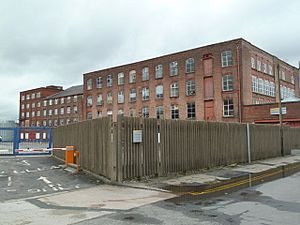Joseph Crook facts for kids
Joseph Crook (born 1809 – died 8 December 1884) was a British politician. He was a member of the Liberal Party. He served as a Member of Parliament (MP) for the town of Bolton.
Joseph Crook was born in 1809. He was the oldest son of Joshua Crook. In 1856, he married Mary Biggs. They had at least one son together. Joseph took over his father's business, J. & J. Crook. This company made cotton textiles at Spring Mills. It was the second-largest employer in Bolton.
Contents
Becoming a Member of Parliament
Crook was first elected to Parliament in the general election of 1852. Bolton had two parliamentary seats. He won one of them. Another Liberal politician, Thomas Barnes, won the other seat. Barnes received slightly more votes than Crook.
In the 1857 election, Barnes lost his seat. However, Crook was elected again. He won alongside William Gray, a Conservative politician. Both Crook and Gray kept their seats in the 1859 election. They were the only two candidates running.
Leaving Parliament
In 1861, Joseph Crook decided to resign from Parliament. He said he needed more time to focus on his business. Thomas Barnes then replaced him in an election where no one ran against him.
Important Work in Parliament
Joseph Crook was known for his work in Parliament. In 1860, he wrote and successfully proposed the Bleachers' Short Time Act. This law was very important. It gave workers in the bleaching industry similar rights to those in other factories. He had tried to pass this law since 1853.
Crook supported many important causes. He believed in women's suffrage, which meant women should have the right to vote. He also supported manhood suffrage, meaning all men should be able to vote. He wanted voting areas to be equal in size. He also supported Irish Home Rule, which meant Ireland should manage its own affairs. He believed in direct taxation, where people pay taxes directly. He also wanted Parliament to meet every year.
He was the chairman of the United Kingdom Alliance for some time. This group worked to reduce alcohol use. He was also involved with the Peace Society, which promoted peace. He was against the Crimean War.
Life After Parliament
Even after leaving Parliament, Crook remained interested in politics. He was a member of the Bolton Council from 1868 to 1871. He also served as a Justice of the Peace. This role meant he helped keep law and order. He also served on the Board of Guardians, which looked after the poor.
Crook helped run the Bolton Liberal Club. In 1869, he started the local branch of the National Education League. This group worked to improve education. He was also a trustee of the Bank Street Unitarian Chapel. A special plaque was put there to remember him. Joseph Crook was a Unitarian himself. Unitarians believe in one God and emphasize reason and individual freedom in faith.
Later Life
Joseph Crook used to live at Chamber Hall in Bolton. He later moved to Oakfield in Heaton. He died at his home on 8 December 1884.
 | Kyle Baker |
 | Joseph Yoakum |
 | Laura Wheeler Waring |
 | Henry Ossawa Tanner |


